 Petzlover
Petzlover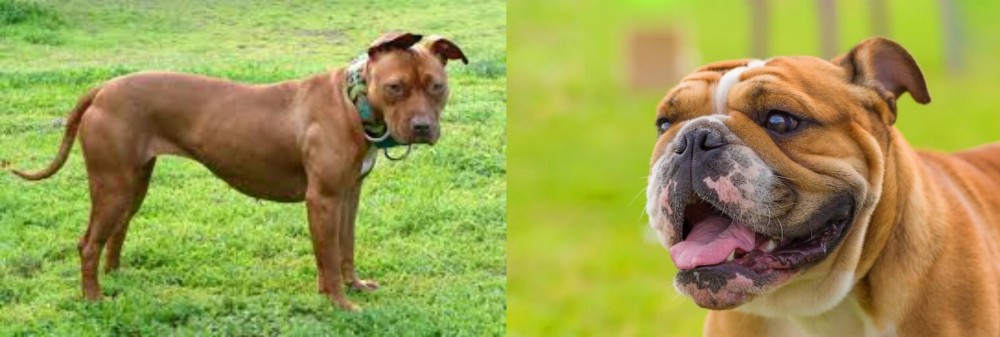 American Pit Bull Terrier is originated from United States but Miniature English Bulldog is originated from United Kingdom. American Pit Bull Terrier may grow 21 cm / 9 inches higher than Miniature English Bulldog. American Pit Bull Terrier may weigh 12 kg / 27 pounds more than Miniature English Bulldog. American Pit Bull Terrier may live 3 years more than Miniature English Bulldog. American Pit Bull Terrier may have more litter size than Miniature English Bulldog. American Pit Bull Terrier requires Low Maintenance. But Miniature English Bulldog requires Moderate Maintenance
American Pit Bull Terrier is originated from United States but Miniature English Bulldog is originated from United Kingdom. American Pit Bull Terrier may grow 21 cm / 9 inches higher than Miniature English Bulldog. American Pit Bull Terrier may weigh 12 kg / 27 pounds more than Miniature English Bulldog. American Pit Bull Terrier may live 3 years more than Miniature English Bulldog. American Pit Bull Terrier may have more litter size than Miniature English Bulldog. American Pit Bull Terrier requires Low Maintenance. But Miniature English Bulldog requires Moderate Maintenance
 The history of the American Pit Bull Terrier might be a confusing one to some dog lovers and certainly to the general public that tends to lump all the “bully” breeds into a category called “pit bull”. This is because of the negative reputation this group of breeds has acquired over the past 30-50 years due to misuse and mis-breeding by the dog fighting industry. This categorization includes the American Pit Bull Terrier, The American Staffordshire Terrier, the Bull Terrier and the Staffordshire Bull Terrier.
The history of the American Pit Bull Terrier might be a confusing one to some dog lovers and certainly to the general public that tends to lump all the “bully” breeds into a category called “pit bull”. This is because of the negative reputation this group of breeds has acquired over the past 30-50 years due to misuse and mis-breeding by the dog fighting industry. This categorization includes the American Pit Bull Terrier, The American Staffordshire Terrier, the Bull Terrier and the Staffordshire Bull Terrier.
There is major confusion and disagreement on the difference between the American Pit Bull Terrier and the American Staffordshire Terrier. The AKC does not recognize the American Pit Bull Terrier as a separate breed, but its founder and the UKC, ADBA do so. In the 1930’s the American Pit Bull Terrier was a recognized breed and in response to the negativity of pit-fighting, they renamed it as the American Staffordshire Terrier.
The American Pit Bull Terrier was developed to be a little larger in size than the Staffordshire in both height and weight. This breed comes from crossing various Bull and Terrier breed to get a working dog. The Amstaff for the most part is bred to be a show dog and is not usually a “street dog” used in dog fighting rings. The direct ancestors of the APBT are the Old English Bulldogs and the Old English Terriers. These dogs are great family dogs, gentle beyond comparison unless raised to fight. They make great therapy dogs as well as police dogs. They are not by nature cruel, aggressive or attack dogs.
Both professional confirmation breeders and street fight breeds have developed new strains of the American Pit Bull Terrier. A few are worth mentioning here.
One of the oldest strains of the American Pit Bull Terrier they are red in color and that red is a very unique tone. They have a copper colored coat and nose with red nails, red lips and amber or red eyes. These dogs were originally from Ireland and when they came to America they had the red nose. Originally bred for gameness, it is the red color that is sought after now.
These are another old breed, but they have black noses and were initially bred by John P. Colby in the late 1800s. These dogs were known to be indominable fighting dogs and were bred into almost every line of American Pit Bull Terriers that exist today. The line is still maintained by the Colby family.
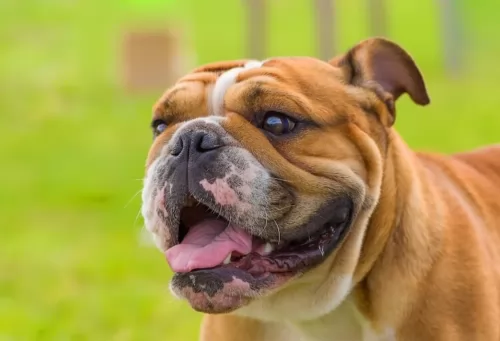 The Miniature Bulldog is such a cute little dog, hailing from England in the 18th and early 19th centuries. The exact development of the dog is unclear and it seems as though the breeders weren’t working together and were working in two different directions.
The Miniature Bulldog is such a cute little dog, hailing from England in the 18th and early 19th centuries. The exact development of the dog is unclear and it seems as though the breeders weren’t working together and were working in two different directions.
There is a lot of debate about the very name ‘miniature’ too because some breeders gave this name to a hybrid mix of a Pug and Bulldog. It seems some breeds were created by crossing English Bulldogs with French Bulldogs to decrease their size. Certainly the origins for the Miniature Bulldog are unknown and there isn’t one particular breeder who can be credited with developing the breed.
Because the Miniature Bulldog is a hybrid breed, it isn’t accepted by the AKC, but it is accepted by the American Canine Hybrid Club as well other registries.
 True to their reputation as fighters, the American Pit Bull Terrier looks like one – powerful, strong and well built. This belies their gentle disposition but too often they are judged by their looks. With a broad, brick shaped head, thick neck and deep chest, they are stocky, muscular and agile. They usually have cropped ears, but the tails are not docked. Their legs are strong and hindquarters especially muscular. These dogs are much stronger than they look. Round soulful eyes are one of the traits that people who keep these dogs as companion animals love about them. They have a scissor bite and one of the strongest jaws of all domesticated canines.
True to their reputation as fighters, the American Pit Bull Terrier looks like one – powerful, strong and well built. This belies their gentle disposition but too often they are judged by their looks. With a broad, brick shaped head, thick neck and deep chest, they are stocky, muscular and agile. They usually have cropped ears, but the tails are not docked. Their legs are strong and hindquarters especially muscular. These dogs are much stronger than they look. Round soulful eyes are one of the traits that people who keep these dogs as companion animals love about them. They have a scissor bite and one of the strongest jaws of all domesticated canines.
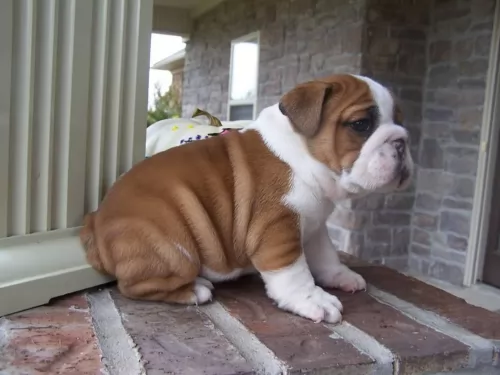 Because the Miniature Bulldog is a cross between two purebred breeds – the Pug and the English Bulldog. You can expect different looks and characteristics from each breed.
Because the Miniature Bulldog is a cross between two purebred breeds – the Pug and the English Bulldog. You can expect different looks and characteristics from each breed.
Your mini Bulldog is a small breed dog standing between 25 and 35cm male and female and weighing between 11 and 18kg. The average litter size for these dogs is about 4 puppies.
The Miniature Bulldog has a short coat which sheds moderately and that comes in different colors such as tan and white, brindle, with black and grey also having a show in.
The Miniature Bulldog is a social, friendly breed who is able to get on well with all members of the family, including children and pets in the home. His very stature makes it that he isn’t the most active of dogs, but nonetheless you still want to exercise him and take him for walks to avoid obesity.
As with all dogs, training and socialization are imperative because this is a strong-willed dog who wants to go his own way.
 For those who live with the American Pit Bull Terrier there is no better dog. The APBT loves people and loves children. They think they are lap dogs, and they certainly are watch dogs. They love their people but their barks at strangers at home are not because they are protecting their people but rather they are greeting the strangers into their home. Unfortunately, they will not greet another dog in the same way. However, when their people are seriously threatened they will give their lives to defend them.
For those who live with the American Pit Bull Terrier there is no better dog. The APBT loves people and loves children. They think they are lap dogs, and they certainly are watch dogs. They love their people but their barks at strangers at home are not because they are protecting their people but rather they are greeting the strangers into their home. Unfortunately, they will not greet another dog in the same way. However, when their people are seriously threatened they will give their lives to defend them.
These are strong, confident dogs who want to please their people. They love children and make great family dogs but require a strong owner and a strong pack leader. The need to be under control around other dogs and because of their strength, need a strong owner. It is their aggression towards other animals that must be controlled.
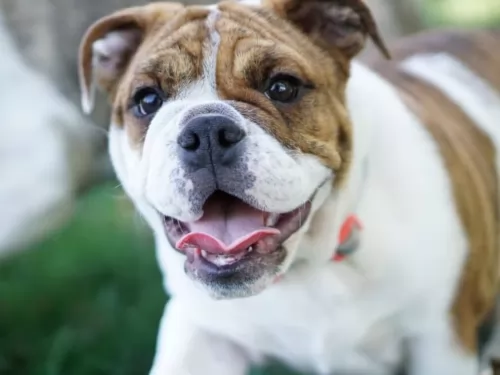 You’ll love having one of these entertaining, friendly dogs by your side. He is docile, social, fun and a bit stubborn too but he is able to get on well with children in the home as well as with other pets.
You’ll love having one of these entertaining, friendly dogs by your side. He is docile, social, fun and a bit stubborn too but he is able to get on well with children in the home as well as with other pets.
He can adapt to life in the city as well as in the countryside as he doesn’t require too much exercise.
Take special care of him and he’ll make you a splendid family pet.
 Though the American Pit Bull Terrier is healthier than most large dogs, they do have an issue with hip dysplasia. Breeders have been working to breed this out of the APBT and their work in this area has helped with the other issues with the patella, heart and thyroid. The APBT can have skin allergies and Demodex Mange. This condition can be either deadly or just a localized skin issue. Immunizations and testing is essential for this breed. When not immunized, American Pit Bull Terrier puppies have a greater incidence of parvovirus than other breeds. They also might have cataracts and congenital heart disease.
Though the American Pit Bull Terrier is healthier than most large dogs, they do have an issue with hip dysplasia. Breeders have been working to breed this out of the APBT and their work in this area has helped with the other issues with the patella, heart and thyroid. The APBT can have skin allergies and Demodex Mange. This condition can be either deadly or just a localized skin issue. Immunizations and testing is essential for this breed. When not immunized, American Pit Bull Terrier puppies have a greater incidence of parvovirus than other breeds. They also might have cataracts and congenital heart disease.
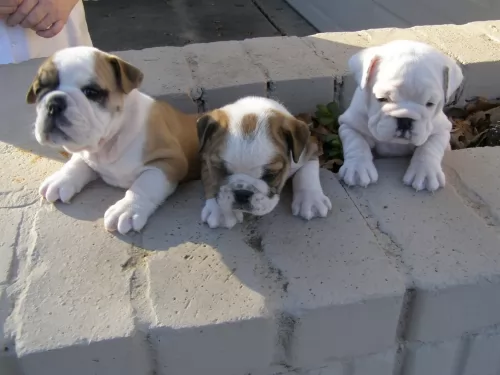 Unfortunately the origins of the Miniature English Bulldog are not 100% clear and therefore other important information isn't readily available.
Unfortunately the origins of the Miniature English Bulldog are not 100% clear and therefore other important information isn't readily available.
These dogs are always prone to breathing and nasal abnormalities because of the shape of their faces as well as being prone to heart deficiencies. Snoring, grunting and quite a bit of panting is part and parcel of the mini English Bulldog.
They’re also prone to overheating, cherry eye and hip dysplasia. It is most unlikely that your Miniature English Bulldog is going to get any of these illnesses and the good news is that he can live to be up to 12 years of age.
 How you feed your American Pit Bull Terrier puppy is important to her health as an adult and long life. The adult dog should be fed one and a half to two and a half cups of high quality food twice a day. Puppies should be fed more often as they grow. DO not feed your APBT soft or canned dog food. Their food should be dry. Be careful not to feed too much as you do not want an obese American Pit Bull Terrier.
How you feed your American Pit Bull Terrier puppy is important to her health as an adult and long life. The adult dog should be fed one and a half to two and a half cups of high quality food twice a day. Puppies should be fed more often as they grow. DO not feed your APBT soft or canned dog food. Their food should be dry. Be careful not to feed too much as you do not want an obese American Pit Bull Terrier.
As previously mentioned this is a healthy breed with problems with:
These are usually inherited, and the pup may show signs early, or they could be developed later in life. They can be removed.
Hip dysplasia as in many larger, stronger breeds this can be a major problem. Breeds should test for it and APBT breeders are attempting to breed it out of the APBT.
This is a congenital issue that breeders are also breeding against and if they have it your American Bit Bull Terrier was likely born with it.
Many APBT are allergic to grasses or out outside allergens. Shots or medication can deal with these.
This is an athletic, joyful breed that loves to play, love sports and loves any activity that bonds it with its family. Some of the many sports the American Pit Bull Terrier likes to participate in include: agility, obedience competition, weight pulling, lure coursing and fly ball. He also needs backyard exercise and daily walks.
When walking your American Pit Bull Terrier, make sure she is on a leash as the breed has a tendency to be aggressive with other dogs coming into their space. The APBT loves to work. They are good therapy dogs, search and rescue dogs, even service dogs.
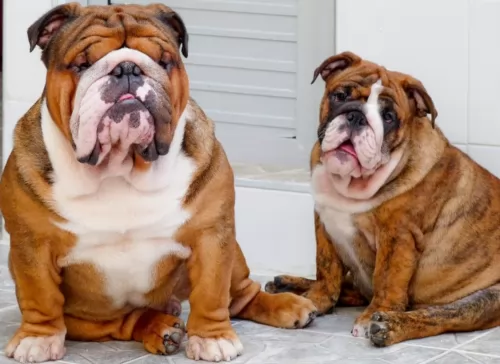 Feeding the Miniature English Bulldog is hugely important. It is imperative that he doesn't become obese. Buy the best dog food there is and see to it that he also gets some home-made food. Chop up boiled chicken, brown rice ad vegetables for your pet and mix occasionally into his dry kibble.
Feeding the Miniature English Bulldog is hugely important. It is imperative that he doesn't become obese. Buy the best dog food there is and see to it that he also gets some home-made food. Chop up boiled chicken, brown rice ad vegetables for your pet and mix occasionally into his dry kibble.
Dogs love simple food – their stomachs can’t cope with different foods. They appreciate consistency with uncomplicated but nutritious foods. The bulldog is a dog which can easily overheat, so make sure he has constant access to fresh cool drinking water. On a hot day you can even use a spray bottle and allow some spray mist sprayed into his face to cool him down.
The Mini English Bulldog is a dog that sheds so you will need to brush him at least twice a week to get rid of loose hair.
Check around his eyes and inside his ears for infection.
Brush his teeth 2 or 3 times a week to get rid of plaque so as to prevent dental decay which can be detrimental to his health.
His face and body have wrinkles, making him more susceptible to skin allergies and you’ll need to keep your eye open for these as they can be terribly painful and frustrating for your pet.
Keep his nails trimmed.
He is neither sleek, agile or quick and you can see just by looking at him that he isn’t designed for being sporty. A slow walk every day will be enough for him as well as some easy-going games inside.